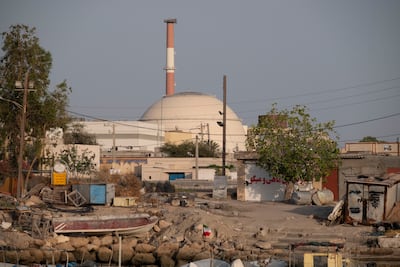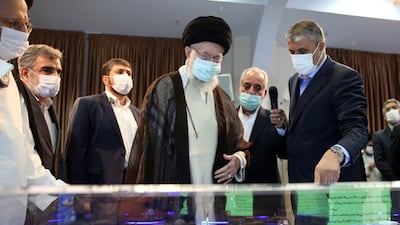Britain, France and Germany have submitted a draft resolution in time for this week’s UN nuclear watchdog board meeting which presses Iran again to explain uranium traces found at undeclared sites.
The text submitted by the European powers, known as the E3, also covers matters such as the barring of inspectors.
It follows a resolution passed 18 months ago ordering Tehran to urgently comply with a years-long International Atomic Energy Agency (IAEA) investigation into the uranium traces.
The new text calls on Iran to co-operate without delay, including allowing the IAEA take samples if the agency needs them.
It also goes further, addressing problems that have arisen more recently, such as Iran's barring of many of the IAEA's senior uranium-enrichment experts on the inspection team.
It calls on Iran to reverse that step and honour a March 2023 joint statement that the IAEA regards as a pledge of co-operation.
The text reads: "[The UN nuclear watchdog board] calls on Iran to provide sufficient co-operation with the agency and take the essential and urgent actions as decided by the board in its November 2022 resolution, to resolve safeguards issues which remain outstanding despite numerous interactions with the agency since 2019.”
The 35-nation board of governors meets quarterly and is one of the IAEA's two main policy-making bodies. The other meets once a year.
Since the 2022 resolution, the number of sites being investigated from traces was cut from three to two, but Iran still has not explained how the traces got there. The IAEA refers to that as “outstanding safeguards issues”.

The E3 is pushing for the resolution despite US concerns the move could lead to Iran escalating its nuclear activities, since Tehran has rejected such resolutions and taken such steps in response.
The E3 would not have submitted the text had they not been confident it would pass. Russia and China opposed the last resolution against Iran.
Iran is enriching uranium to up to 60 per cent purity. Weapons grade purity is 90 per cent. If enriched further, the material Iran has could be used to build three nuclear weapons, according to the IAEA.
In the opinion of western powers there is no credible civilian justification for enriching to that level, and the IAEA said no other country has done so without producing nuclear weapons. Iran said its nuclear aims are entirely peaceful.
The text says if Iran fails to co-operate, IAEA director general Rafael Grossi is empowered to draw up a “comprehensive” report, which would further increase pressure on Tehran.
“Continued failure by Iran to provide the necessary, full and unambiguous co-operation with the agency to resolve all outstanding safeguards issues may necessitate the production, by the director general, of a comprehensive and updated assessment on the possible presence or use of undeclared nuclear material,” it said.


